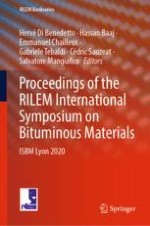2022 | OriginalPaper | Buchkapitel
Establishing Correlations Between Force Ductility and DSR Parameters of Asphalt Emulsion Residues
verfasst von : Nazimuddin M. Wasiuddin, Mohammad Islam
Erschienen in: Proceedings of the RILEM International Symposium on Bituminous Materials
Aktivieren Sie unsere intelligente Suche, um passende Fachinhalte oder Patente zu finden.
Wählen Sie Textabschnitte aus um mit Künstlicher Intelligenz passenden Patente zu finden. powered by
Markieren Sie Textabschnitte, um KI-gestützt weitere passende Inhalte zu finden. powered by
